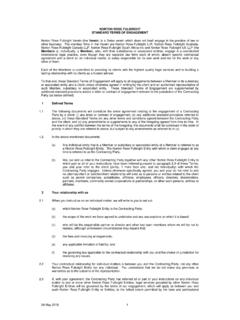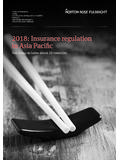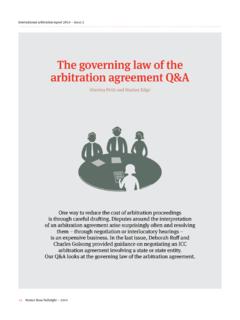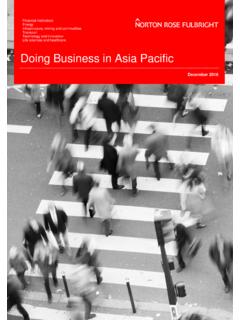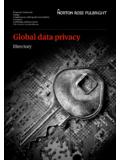Transcription of Non-U.S. Banks Operating in the United States—The …
1 March/April 2014 Vol 27 / No 4 Banks Operating IN THE United states 37 Banks Operating in the United states The federal reserve as gatekeeper Individual state laws traditionally controlled the ability of foreign Banks to maintain banking offices in this country but, since 1978, the role of the federal reserve has evolved to the point where it has become the gatekeeper for foreign Banks that wish to maintain a banking presence in the United states . Today, there is a comprehensive federal regulatory regime for foreign bank operations that confers broad authority on the federal reserve . This article discusses the growth of the federal reserve s role in supervision of the operations of foreign Banks , and highlights some of the most recent developments from the Dodd-Frank Act.
2 KATHLEEN A. SCOTT N Banks , or foreign Banks 1 as most and state banking regulators call them, have maintained places of business in the United states for over 100 years, such as in New York State. 2 Initially, only state law controlled those opera-tions, but over time, the Board of Governors of the federal reserve System (the federal reserve ) has become the gatekeeper for foreign Banks that wish to maintain a banking presence in the United states . Today, there is a comprehensive federal regulatory re-gime for foreign Banks operations that confers broad authority on the federal reserve and clearly demonstrates that there is a national policy that in-dividual state-by-state supervision of offi ces of foreign Banks is no longer the only structure for over-sight of the operations of foreign Banks .
3 Surveys have shown that foreign Banks bring jobs to the United states for citizens and residents, as well as expatriate employees assigned to a offi ce of a foreign bank , and there is a positive economic impact on the local economy where they maintain operations. 3 Despite the increasing costs to Banks generally of doing business and ensuring compliance with all applicable law, foreign bank operations in the United states provide important economic benefi ts to the economy. This article will provide an overview of the federal reserve s role in the supervision and regulation of foreign Banks Operating in the United states , includ-ing qualifi cations for entry and permissible activities in the United states , and also will highlight some of the new requirements imposed on foreign Banks by the Dodd-Frank Wall Street Reform and Consumer Protection Act of 2010 (the Dodd-Frank Act ).
4 4 HOW FOREIGN Banks MAY OPERATE IN THE United states Foreign bank operations in the United states can take several forms. A foreign bank may operate through a direct banking offi ce in the United states such as a Kathleen A. Scott is Senior Counsel at Norton Rose Fulbright in New York, focusing on financial services regulatory matters. She may be reached at See Institute of International Bankers, Economic Benefits to the United states From the Activities of International Banks (Feb. 2008), available at (last visited Feb. 18, 2014).4 111-203 (July 21, 2010).1 The word foreign is of course a relative term.
5 To avoid confusion, this article uses the term foreign bank instead of bank because that is the term used in most state and federal banking laws when referring to See New York Department of Financial Services (formerly the New York State Banking Department) General Industry Let-ter Foreign Banks in New York (June 1996), available at (last visited Feb. 18, 2014). 3704/05/2014 06:33:5804/05/2014 06:33:58 Authorized Reprint 38 JOURNAL OF TAXATION AND REGULATION OF FINANCIAL INSTITUTIONS March/April 2014 Vol 27 / No 47 S. Rep. 95-1073 (Aug. 8, 1978).8 No. 95-369 , 7(c).9 12 12 1843(c)(8).
6 11 A commercial lending company is a company formed under state law that maintains credit balances incidental to or arising out of the exercise of banking powers and engages in the business of making commercial loans. Primarily, this is a reference to what is called an Article XII investment company under Title XII of the New York Banking 12 3106; 12 1841 et See 12 95-369 (Sept. 17, 1978); 12 3101 et or agency, or a nonbanking representative of-fi ce, which can solicit business and act as liaison with customers. A foreign bank also may own a retail bank with deposits insured by the federal Deposit Insur-ance Corporation (FDIC).
7 Many large Banks are in fact owned by foreign Banks for example, Citizens bank is affi liated with The Royal bank of Scotland, TD bank USA is owned by Canada s Toronto-Dominion bank , and BMO Harris bank is owned by Canada s bank of Montreal. Finally, a foreign bank may operate through a sub-sidiary that engages in nonbanking activities, which may require a state license (such as a money transmit-ter) or a charter (such as a limited purpose trust com-pany), or which may allow the foreign bank to engage in very limited banking operations in the United states (an Edge or Agreement Corporation 5 ). federal STATUTORY AUTHORITY OVER OFFICES OF FOREIGN Banks International Banking Act.
8 Beginning in 1978, with the enactment of the International Banking Act of 1978 (IBA), 6 the federal reserve was given increasing statutory authority over foreign bank operations in the United states . Prior to enactment of the IBA, direct offices of foreign Banks were subject only to state law, such as the New York State Banking Law. states licensed foreign Banks to maintain branches, agencies, or representative offices and chartered banking subsidiaries or approved the establishment of nonbanking subsidiaries. Due to certain restrictions in the 1970s on the activities of domestic Banks and their holding companies, direct offi ces of foreign Banks in the United states had a competitive advantage over do-mestic Banks and domestic bank holding companies in the types of activities in which they could engage.
9 Foreign Banks could locate branches wherever they wanted (which a bank generally could not do at the time) and they could engage in nonbanking activities that a bank could not. As the Senate Report to the IBA noted, There is, at this time, no uniform national policy con-cerning foreign banking operation in this country. As a result, foreign Banks enjoy many competitive advan-tages over our domestic Banks . This bill establishes the principle of parity of treatment between foreign and domestic Banks in like circumstances.. Enactment of a rational framework of federal regulation at this time is appropriate and will serve to avoid future problems while enhancing the competitive environment.
10 7 While the IBA did not authorize the federal Re-serve to approve the establishment by foreign Banks of direct banking offi ces in the United states , it did give the federal reserve the authority to examine state-licensed branches and agencies of foreign Banks and to require those offi ces to submit periodic reports of the fi nancial condition of the banking offi ce. 8 In addition, for the fi rst time, a foreign bank could have a direct banking offi ce licensed by the Trea-sury Department s Offi ce of the Comptroller of the Currency (OCC) (a federal branch ). The OCC is the federal agency that charters national Banks and federal savings Banks .


